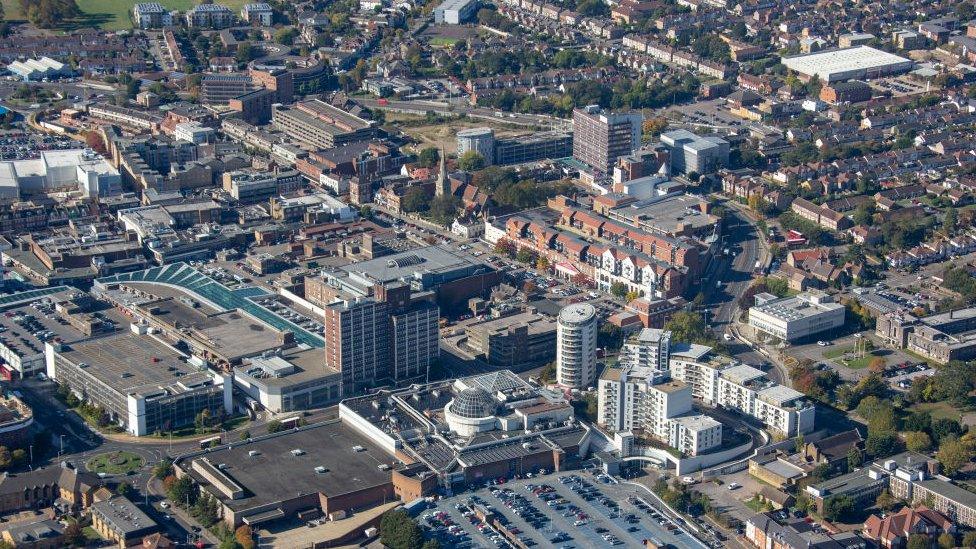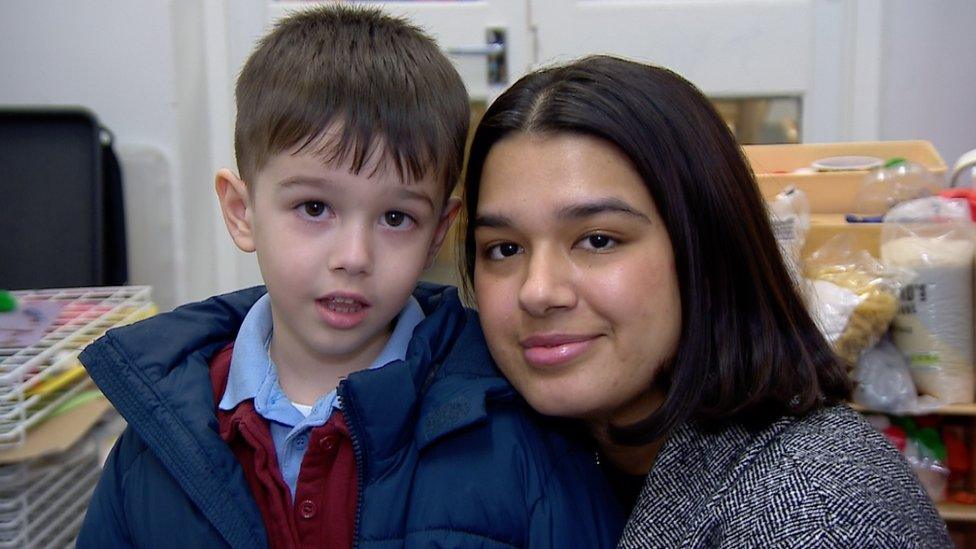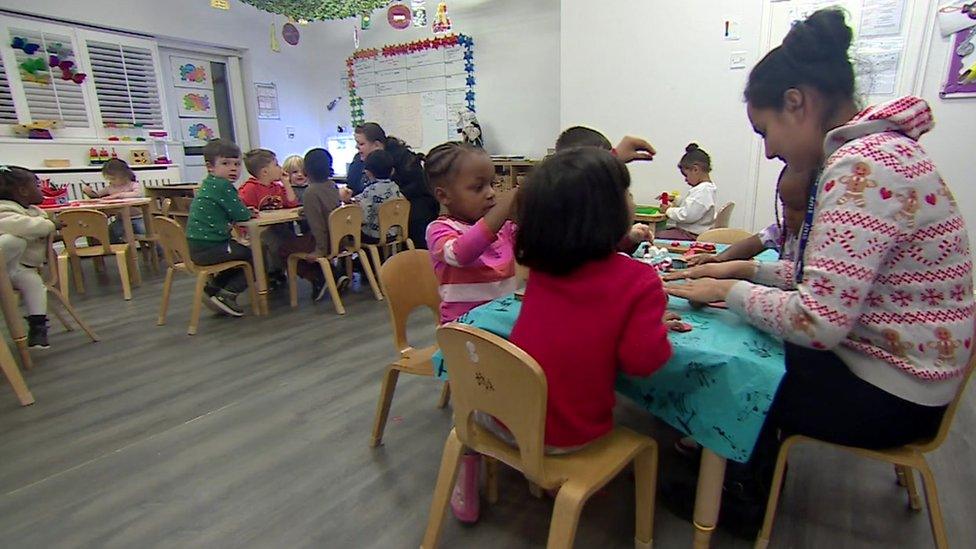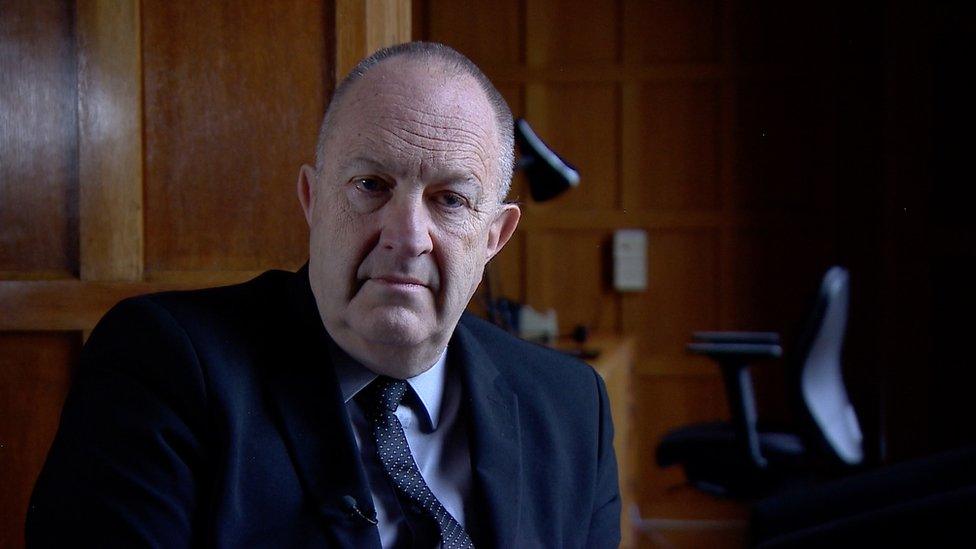Leaving London: Pressure on outer boroughs as families move in
- Published

Havering is struggling to manage its finances under decreased funding and a swelling population
London's suburbs are being placed under a huge amount of strain as an increasing number of families move out of the capital. Nurseries are bursting to the point where babies who have not even been born are being registered with them while schools and care homes are struggling to cope with demand. Council budgets are under pressure.
Havering, on the Essex-London border, is one such area.
Attracted by the east London town's affordable housing, green spaces, relatively low crime rates and the Elizabeth line, Shea said she made the move from East Ham to Havering for a bigger flat and better schooling.

Shea moved from East Ham to Havering
Once settled into the area, Shea said she struggled to find available childcare.
"When I first moved here, I emailed lots of nurseries and most didn't get back to me or have space," she said.
"I have friends who have recently moved here and they are just not getting anywhere because it is just so full everywhere."
Another parent, Kirsty, told me she had spent about nine months trying to find a nursery space for her son.
Louise Farrow, who manages the Fledglings nursery in Romford, said despite opening two more premises in the past 18 months, they could not keep up with demand: in the last six months, registrations have increased by 80%.
"Those new nurseries are already almost full in their first year because of the demand of parents coming into the area and needing childcare," she said.
"We are having parents who are looking a year in advance. We took a registration for a child this week for 2025 and the baby's not born yet. It's new families, young parents, people who need to get to London."

Fledglings nursery in Romford has opened two new nurseries to try and cope with demand
Figures from the Office of National Statistics show the borough has the fourth fastest increase of people aged 0-14 in the country.
At the other end of the life spectrum, it is also an area with one of the highest numbers of older people. The local authority funds 54 care homes across the borough, while the council in Tower Hamlets, which is in the same part of London but nearer the centre, funds 10.
Havering Council's leader Ray Morgon explained: "Over a number of years, the demographics in Havering have radically changed. We've always been known to be an elderly borough - we still are - but what has radically changed is the young persons population."
He added: "Despite increase the demand for services, the budgets have not. Equally, the cost of care has rapidly increased.
"The funding that we get from central government just doesn't touch the sides to meeting those needs."

Measures are being taken to try to address this shortage for schools: next year, the council will receive nearly 60% of the budget allocated to London for the government's basic capital needs fund. Just shy of £20m, it will help pay for infrastructure like new school buildings.
But Mr Morgon says it is still not enough, as part of the schools funding was based on census data which was "woefully out of date".
"Generally speaking, in the next few years we are going to see many more councils become bankrupt.
"We really we need a total review of how local government is funded, especially for schools. Without that, we can only delay these problems, not fix them," he added.

Council leader Ray Morgon says the funding it receives did "not touch the sides"
On average, councils in London have experienced a 18% decrease in funding from central government in the past 10 years, according to London Councils.
Havering's Revenue Support Grant has gone from £70m in 2010-2011 to just under £2m today.
Mr Morgon said unless more funding was found, the authority could be forced to issue a Section 114 notice, external, meaning central government would take over its spending.
The short-term solutions to stave off a Section 114 and produce revenue for councils involve selling-off assets, such as land owned by the council, as well as cutting non-essential services like youth centres and closing all library services but one. Other areas of help include loans from the government.
In a statement, Education Secretary Gillian Keegan said that outer London schools will receive £112 more next year per pupil, under its latest budget proposals.
"Ensuring schools are funded at their highest level in history in real terms will give parents and schools the confidence that education continues to be the top priority for this government," she said.
"Overall school funding for mainstream schools and high needs in England is increasing by over £1.8bn in 2024-2025 compared to 2023-24, taking the total funding to over £59.6 billion.
"That also builds on the significant extra investment provided to schools as part of this year's teacher pay offer."
But as the central London exodus shows no sign of slowing and more councils edge closer to effective bankruptcy, two elections next year - the mayoral and general - may affect how peripheral London boroughs and neighbouring counties will be able to manage their resources in the long term to cope with this demand.

Listen to the best of BBC Radio London on Sounds and follow BBC London on Facebook, external, X, external and Instagram, external. Send your story ideas to hello.bbclondon@bbc.co.uk, external
- Published4 May 2023